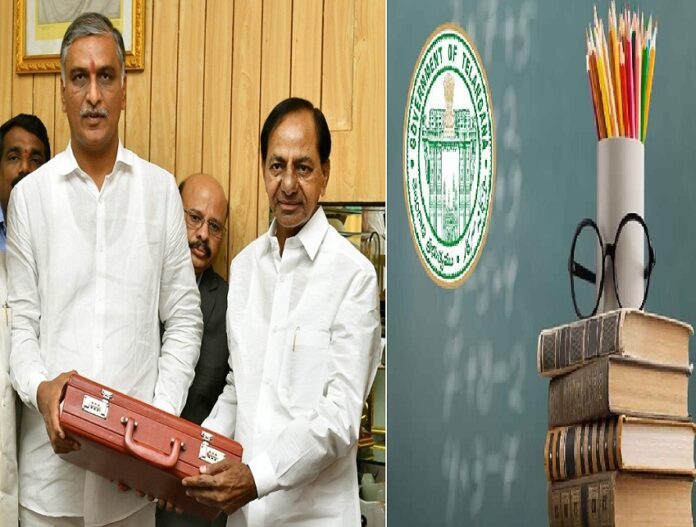Always the education sector is neglected in budget allocations and developmental activities. The TRS government, in power from the state’s formation in 2014, has consistently reduced the share of the budget for education over the years.
Continuing with the trend of falling budgetary allocation for the education sector, the Telangana Rashtra Samithi (TRS) government has earmarked a paltry 6.24% of the budget for the 2022-23 financial year. In absolute numbers, this translates into Rs 16,042 crore out of the total outlay of Rs 2,56,958 crore.
Allocation for education for 2022-23 fiscal
After the formation of the state in 2014 following a protracted struggle for statehood, the TRS government, which assumed power in the new state, has consistently reduced the share of the budget for education over the years. From 10.89% of the budget outlay in 2014-15 to a little over half of it in the upcoming financial year, the sector has seen a continuous dip in monetary resources over the eight years.
Although for the 2022-23 fiscal the state government has increased the budget for the secondary education sector by Rs 2, 470 crore compared to the last fiscal, teachers in the state are not convinced that over the next year, the promised amount would be spent for the purpose. Their skepticism stems from the fact that Rs 2,000 crore earmarked for upgrading schools the last fiscal was not spent, and the proposed plan to enhance the quality of schools did not take off at all.
As the budgetary share of the education sector dips in Telangana year after year, the state manifestly fails to comply with the recommendations of the Kothari Commission, which suggested 30% of the budget be earmarked towards education. The record of the Union government in this regard is no better, for less than 10% of the Union budget is set aside for education every year.
Budgetary allocation over the years
Given this backdrop, those in the education sector in Telangana are cynical of the state government’s grand promise of Rs 7,289 crore over the next two years on the recently announced Mana Ooru Mana Badi (My Village, My School) programme. Though very reassuring – as the programme aims to upgrade infrastructure in schools – many doubt its implementation.
“By allocating less than 11% of the budget towards education from 2015-16 onwards, the government has diverted Rs 30,000 crore over the years to other areas. By allocating merely one-fourth of that amount, the government is patting itself on the back,” rues K. Venugopal, chief editor of the magazine of Telangana Progressive Teachers Federation (TPTF).
The government now talks about building new classrooms (8,000 in number), toilets, and providing electricity and water facilities in schools. “But, all those should have been available in schools by default,” he adds.
Venugopal flags the dire shortage of teachers as another pressing problem for government schools in Telangana. “The government, which recruited 25,000 Vidya Volunteers two years back, hasn’t shown any interest in filling up 30,000 teacher vacancies. On the other hand, seats in BEd colleges are not being filled up. As a result, the education sector in the state is not attracting the best talent. Many youngsters, who could have sought opportunities in teaching, are forced to look for better opportunities elsewhere due to the dismal state of the education sector in the state,” he explains.
As far as BEd colleges are concerned, 152 teaching posts out of the total 166 posts are vacant – affecting the quality of trained teachers. Of the sanctioned 538 posts of MEOs (mandal education officers), who oversee primary schools, only 20 are filled up. While the state has 33 districts, there are only 10 DEOs (district education officers). As a result, deputy DEOs are burdened with additional responsibilities. Of the 4,379 government schools in the state, only 1,950 have full-time principals, and the rest are managed by in-charge principals.
“With schools opening after being shut during the peak of the pandemic, statistics point out that the number of students in government schools have gone up by 2.5 lakh. However, there has been no discussion with regard to stepping up infrastructure to accommodate the growing number of students,” alleges Venugopal.
On the other hand, teacher unions lament that the situation of KGBV schools (Kasturba Gandhi Balika Vidyalaya) – which cater to girls who drop out of schools and employ women faculty – is no better. Most of the staff in KGBVs are not permanent staff, and principals and teachers are being paid Rs 25,000 and Rs 20,000 respectively – less than Rs 35,000 per month paid to newly recruited teachers.
To add to the woes of the government teachers, the Telangana government recently issued GO (Government Order) 317, which is being vehemently opposed, and there have been several protests. The GO relates to the allotment of government employees, including teachers, on basis of different criteria to 31 districts of the state. However, the GO has received backlash, with government employees questioning the criteria adopted.
Although offline classes resumed after the second wave of the pandemic in September 2021, the efforts to fix learning gaps, resulting from two years of educational losses, have not yielded any results, laments Chava Ravi, general secretary, Telangana United Teachers Federation.
With the third wave of the pandemic, schools were first to shut down despite the fact that many experts from the world over suggested against it. The restrictions in the third wave, however, didn’t largely apply to bars and restaurants, cinema halls, political meetings and social gatherings in the state.
Woes of private teachers
Private school teachers, who cater to nearly 30 lakh students, in the state are among the hardest hit due to school closures in the pandemic. They endured financial hardships for two years in a row ever since the pandemic struck in early 2020.
Although the government had issued GO (Government Order) 45 on March 22, 2020 guaranteeing a monthly allowance to help them tide over financial losses, the promise was not kept.
Private teachers were thrown into a deep end. A private teacher and his wife died by suicide in struggling to provide for their two children aged under six. The tragic incident took place amidst the high-stakes Nagarjuna Sagar assembly by-poll in the state. With the opposition holding the TRS government responsible for the deaths, Rs 2,000 per month and five kilograms of rice were announced for teachers henceforth.
Private teachers allege that although the government had brought in GO (Government Order) 46 to rein in private school managements to prevent them from increasing school fees in view of the hardships caused by the pandemic, nothing has been done to come to their rescue, in terms of financial aid.
Many of the 2,09,000 private teachers were forced to choose alternative livelihood options to survive.
“Some even worked as daily wage workers. We want the government to enact legislation that assures us our livelihood. We also want an IAS officer to be appointed, along with district-level officers, to address the harassment of women teachers. The schools are paying the teachers per period. Teachers received just Rs 2,000 and 25 kgs of rice for three months from the government. Many schools did not pay teachers full salaries for even the month of January 2022 when schools shut again for 20 days,” recalls Sheikh Shabbir Ali, president, Telangana Private Teachers Forum. #KhabarLive #hydnews







